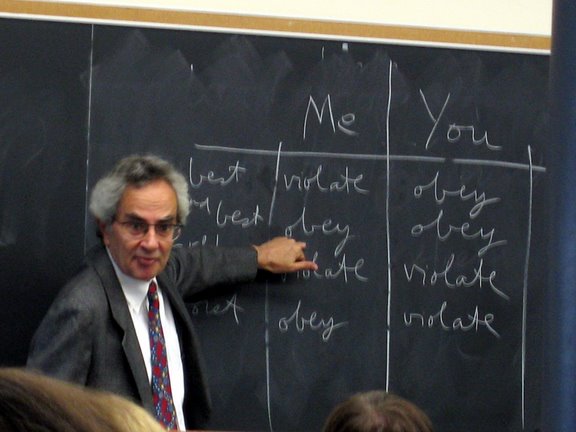"Conceiving the Impossible and the Mind-Body Problem," Royal Institute of Philosophy annual lecture, given in London on February 18, 1998, published in Philosophy vol. 73 no. 285, July 1998, pp 337-352, Cambridge University Press, p. 337.
Thomas Nagel: Cytaty po angielsku
The Last Word, Oxford University Press, 1997, pp. 130-131.
Kontekst: In speaking of the fear of religion, I don’t mean to refer to the entirely reasonable hostility toward certain established religions and religious institutions, in virtue of their objectionable moral doctrines, social policies, and political influence. Nor am I referring to the association of many religious beliefs with superstition and the acceptance of evident empirical falsehoods. I am talking about something much deeper—namely, the fear of religion itself. I speak from experience, being strongly subject to this fear myself: I want atheism to be true and am made uneasy by the fact that some of the most intelligent and well-informed people I know are religious believers. It isn’t just that I don’t believe in God and, naturally, hope that I’m right in my belief. It’s that I hope there is no God! I don’t want there to be a God; I don’t want the universe to be like that.
“I don’t want there to be a God; I don’t want the universe to be like that.”
The Last Word, Oxford University Press, 1997, pp. 130-131.
Kontekst: In speaking of the fear of religion, I don’t mean to refer to the entirely reasonable hostility toward certain established religions and religious institutions, in virtue of their objectionable moral doctrines, social policies, and political influence. Nor am I referring to the association of many religious beliefs with superstition and the acceptance of evident empirical falsehoods. I am talking about something much deeper—namely, the fear of religion itself. I speak from experience, being strongly subject to this fear myself: I want atheism to be true and am made uneasy by the fact that some of the most intelligent and well-informed people I know are religious believers. It isn’t just that I don’t believe in God and, naturally, hope that I’m right in my belief. It’s that I hope there is no God! I don’t want there to be a God; I don’t want the universe to be like that.
"The Absurd" in Mortal Questions, Cambridge University Press, 1979, p. 23.
Źródło: The View From Nowhere (1986), p. 135.
The View from Nowhere. New York, Oxford: Oxford University Press, 1986, p. 16. ISBN: 0195056442.
Źródło: The View From Nowhere (1986), pp. 128-129.
"Subjective and Objective," in Mortal Questions, Cambridge University Press, 1979, p. 196.
